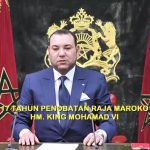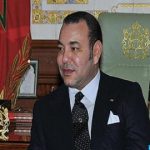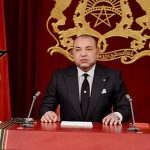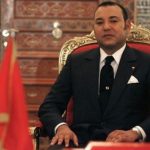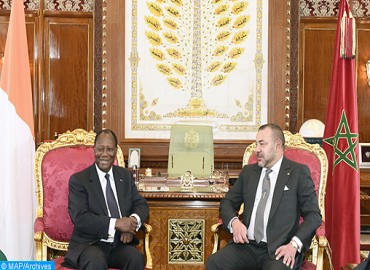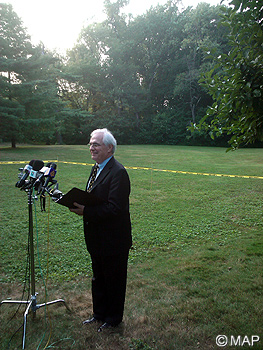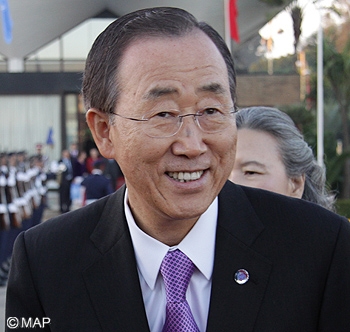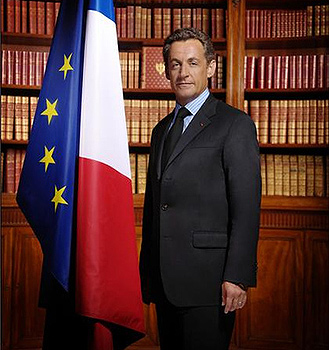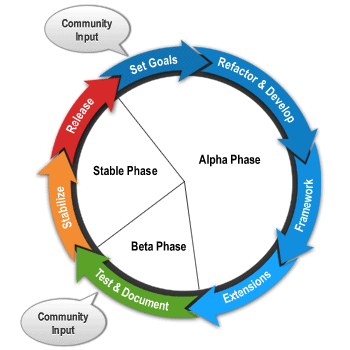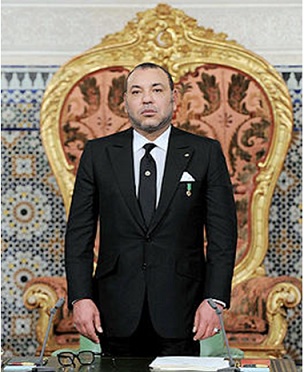Full Text of Royal Speech on 65th Anniversary of the Revolution of the King and the People
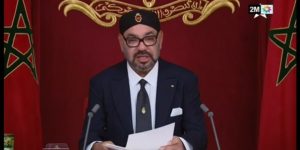 PERSISMA, Rabat – HM King Mohammed VI delivered, on Monday, a speech to the Nation on the occasion of the 65th anniversary of the Revolution of the King and the People. Here follows the full text of the royal speech:
PERSISMA, Rabat – HM King Mohammed VI delivered, on Monday, a speech to the Nation on the occasion of the 65th anniversary of the Revolution of the King and the People. Here follows the full text of the royal speech:
“Praise be to God, May peace and blessings be upon the Prophet, His Kith and Kin
Dear Citizens, Today, we are proudly commemorating the anniversary of the glorious Revolution of the King and the People – an event which means so much to us.
Although it took place in difficult circumstances, it was an enlightening revolution. It taught Moroccans the true meaning of patriotism and helped us move forward.
Today, we are witnessing the dawn of a new revolution – one in which we seek to rise to the challenge of completing the construction of modern Morocco; a revolution through which we aim to give Moroccans the place they deserve in life, especially our young people, whom I have always regarded as the country’s true wealth. Dear Citizens, In the speech I delivered at the State Opening of Parliament, I emphasized the need to put young people at the center of the new development model. I also called for the preparation of an integrated youth strategy and asked that special consideration be given to finding the most effective means to improve young people’s circumstances. Indeed, we cannot ask young people to do their duty without making sure they have the necessary qualifications and opportunities.
We must give our young people what they need in the areas of education, employment, health and so on. More importantly, we must enhance their confidence and give them hope in the future… Enabling young people to engage in social and professional life is not a favor. Every citizen, whatever his or her social background, is entitled to the same opportunities, to a good education and to a decent job.
It pains me to see that the unemployment rate among young people remains high. It is not right that one in four youths should be unemployed, despite Morocco’s overall economic growth record. The figures are even more disturbing in urban areas.
Despite the efforts made, the major economic projects launched and the social programs being implemented, the results achieved do not measure up to my ambitions in this regard. In keeping with the spirit and the policy set out in the State of the Nation Address, I wish to draw attention, once again, to the urgent issue of youth employment, particularly its connection with the education and training system.
We cannot let our education system continue to produce unemployed people, especially in certain branches of study, where graduates – as everyone knows – find it extremely hard to access the job market. Not only is this an outright waste of public resources and of young people’s energies, but it also hinders development and affects the living conditions of many Moroccans.
Strangely enough, many investors and businesses are having difficulty finding the skilled resources they need in a number of trades and specialized sectors. Many young people, especially those with advanced university degrees, are considering leaving the country, not just because of attractive incentives abroad, but also because they do not find the right environment and conditions at home for employment, career advancement, creativity and scientific research.
Generally, the same reasons discourage a number of Moroccan students abroad from coming back home to work once they finish their studies.
In light of the above, I call for a serious, responsible approach to deal with the issue and to offer the attractive incentives needed as well as the appropriate inducements to encourage qualified people to settle in Morocco and work here.
To address the chronic problem of ensuring that skills match labor market needs, and also to reduce joblessness, I call upon the Government and the actors concerned to take a series of measures as soon as possible, particularly the following:
• Firstly, undertake a comprehensive review of public mechanisms and programs for youth employment so as to make them more effective and to ensure they satisfy more adequately young people’s aspirations. This would be in keeping with what I called for in the State of the Nation Address when I referred to social welfare programs.
In this respect, I have decided that a national meeting on employment and training should be convened before the end of the year with a view to making practical decisions, devising new solutions, launching initiatives and charting a specific roadmap to improve the employment situation.
• Secondly, give priority to specialties which create jobs and develop an effective means of giving students career guidance two or three years before the baccalaureate to help them choose between academic studies and vocational training, depending on their abilities and personal preference.
Concurrently with that, I call for the adoption of a framework agreement, involving the government and the private sector, to give a strong impetus to the re-training of students who drop out of school before earning a diploma so that they may be given a second chance at professional and social integration.
• Thirdly, carry out a thorough review of vocational training programs to align them with the needs of businesses and the public sector, and to make sure they are adapted to changes in industry and trades in general, thereby increasing the chances of graduates to access professional life.
Further attention therefore needs to be given to vocational training at all levels, and to creating a new generation of centers for the vocational training of young people, keeping in mind current needs as well as the particularities and expectations of each region.
The Hassan II Fund for Economic and Social Development will contribute to the construction and equipping of new vocational training centers, in the light of emerging needs.
• Fourthly, develop practical mechanisms likely to help achieve a qualitative leap in terms of motivating young people to set up small and medium-sized enterprises in their fields of competence, in addition to promoting self-employment and the creation of socially responsible businesses.
Moreover, government agencies – particularly at local level – should pay what they owe businesses; any delay in payment can potentially lead to bankruptcy and the subsequent loss of many jobs.
How can officials claim to lead by example if government agencies and state institutions fail to honor their obligations?
• Fifthly, develop new mechanisms to help integrate part of the informal sector into the formal economy by providing proper, motivating training to people involved in the informal sector, as well as social security and assistance for self-employment and business creation. • Sixthly, establish a compulsory three-to-six month foreign language course at each training institution and include foreign language learning at all levels of education, especially in technical and scientific branches.
Youth issues are not restricted to training and employment opportunities. They also involve a broadening of intellectual horizons, mental well-being and improved health standards. Dear Citizens,
The spirit and values of the 20th of August, and the unanimity, cohesion and sacrifices underpinning it, are the same as those that galvanize Moroccans whenever it comes to the question of our country’s territorial integrity. In this regard, Morocco has been confidently and responsibly engaged in the dynamic action launched by the Secretary-General of the United Nations, in cooperation with his Personal Envoy.
Our commitment in this connection is based on the same frame of reference I set out last year in my address on the occasion of the anniversary of the Green March. I am pleased to note there is increasing compatibility between these principles and the stances adopted by the international community. Indeed, the recent resolutions of the UN Security Council and the African Union Summit confirm, without a shadow of a doubt, that the United Nations Organization has exclusive authority to manage the political process relating to this question.
I should like to take this opportunity to express my thanks and appreciation to the leaders of African sister nations who have reacted positively to Morocco’s principled stances and responded to the call of the Security Council, which invited the members of the international community to support its efforts. Dear Citizens,
It is God’s will that, this year, the commemoration of the Revolution of the King and the People should coincide with the celebration of the blessed Eid al-Adha. Although the two events differ in essence – one being national, and the other religious – they nonetheless arouse similar emotions in the hearts and minds of Moroccans, given the values of sacrifice and loyalty underpinning them.
In these blessed days, we cannot but pray that Almighty God rest the souls of my revered grandfather, His Majesty King Mohammed V, the hero of liberation and unity, of his comrade in arms, my venerable father, His Majesty King Hassan II and of the nation’s glorious martyrs. This is an opportunity for us to reaffirm our collective commitment to follow in their footsteps, defend Morocco’s unity and stability and seek to achieve the development and progress of the nation and fulfil the aspirations of its sons and daughters.
Wassalamu alaikum warahmatullah wabarakatuh.”

